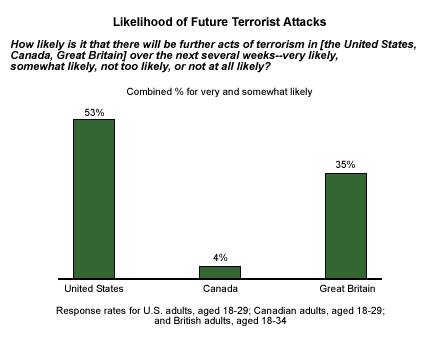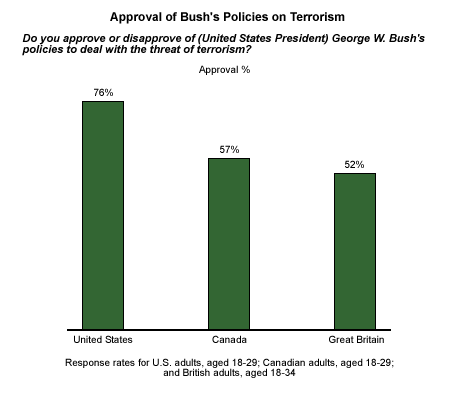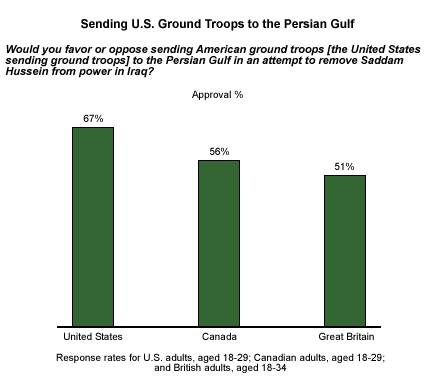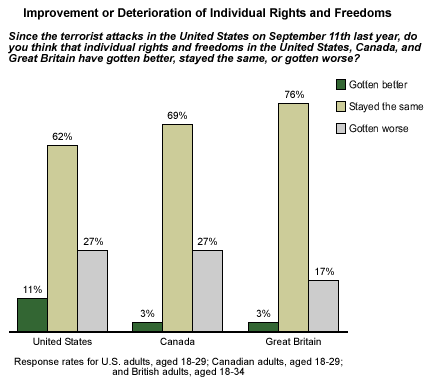As the world focused on the first anniversary of the Sept. 11 terrorist attacks last week, Gallup polled residents of the United States, Canada and Great Britain on their views regarding terrorism and America's actions since that tragic day last year. What are people thinking as they reflect on how the world has changed in the past year?
Terrorist Attacks
Americans and Canadians between the ages of 18 and 29 and Britons between the ages of 18 and 34 are less likely than those over age 34 to believe that acts of terrorism are likely to occur in the next few weeks in their respective countries. Fifty-three percent* of young adults in the United States believe future attacks on their country are very or somewhat likely, compared with 60% of the U.S. population overall. Thirty-five percent** in the youngest age bracket in Great Britain fear future terrorist attacks, compared to 41% overall. Perhaps not surprisingly, only 4%*** of Canadian young people fear the possibility of a terrorist attack in Canada in the next few weeks, but the percentage is still lower than the overall number of 7%.

War on Terrorism
In reaction to the Sept. 11 attacks, President George W. Bush declared a war on terrorism led by the United States and supported by many other countries, particularly Great Britain and Canada. When the young people in these three nations were asked if they approve or disapprove of Bush's policies to deal with the threat of terrorism, a majority in each country said they approve. Three-quarters (76%) of 18- to 29-year-old Americans approve, as do 57% of Canadians in the same age group. British citizens aged 18 to 34 are less likely to approve, at 52%.
In the United States, 30- to 49-year-olds (at 81%) are slightly more likely to approve of Bush's policies than 18- to 29-year-olds, while those 50 and older are less likely than the younger groups to say they approve. In Britain, 18- to 34-year-olds are either as likely or more likely than any other age group to approve of Bush's policies (51% of 35- to 44-year-old Britons approve, as do 39% of 45- to 64-year-olds and 38% of those aged 65 and older), while in Canada the 18- to 29-year-olds are the second least likely age bracket to approve. Canadians over the age of 65 (at 52%) were the only age group less likely than the 18- to 29-year-olds to approve of Bush's policies on terrorism.
Attack on Iraq?
A majority of young adults in the United States, Canada and Great Britain favor sending American troops to the Persian Gulf in an attempt to remove Saddam Hussein from power in Iraq. About two-thirds (67%) of young Americans would favor such action, compared to 56% of their peers in Canada and 51% of young Britons. In the United States, 18- to 29-year-olds (at 67%) are the most supportive of such military action, compared to 63% of 30- to 49-year-olds, 52% of 50- to 64-year-olds and 44% of those 65 and older.


Individual Rights and Freedoms
When asked how their individual rights and freedoms have or have not been impacted since Sept. 11, 2001, most young adults believe that their rights and freedoms have basically stayed the same. In the United States and Canada, about a quarter (27%) of the young people in each country believe that their individual rights and freedoms have gotten worse since last year, while only 17% of those in Britain feel the same way. Only in Canada is the younger generation less positive about their rights and freedoms since Sept. 11 than the general population; 22% of Canadians overall feel that individual rights and freedoms have gotten worse in their country since Sept. 11.

Key Points
Overall, it seems that younger adults in these three countries are less likely their seniors to believe that there will be terrorist attacks in their countries in the near future, and less likely to think that the recent terrorist attacks have affected their rights and freedoms. But interestingly, young people may also be more likely to support an aggressive stance on terrorism: In most cases, they are more likely than older adults to approve of Bush's policies on terrorism, and to support sending U.S. ground troops to Iraq to oust Saddam Hussein.
*Results in the United States are based on telephone interviews with 1,003 national adults, aged 18 and older, conducted Sept. 2-4, 2002. For results based on the total sample of national adults, one can say with 95% confidence that the maximum margin of sampling error is ±3%.
**Results in Great Britain based telephone interviews with 502 national adults, aged 18 and older, conducted Aug. 20-Sept. 2, 2002. For results based on the total sample, one can say with 95% confidence that the maximum margin of sampling error is ±4%. .
***Results in Canada are based telephone interviews with 1,003 national adults, aged 18 and older, conducted Aug. 21-27, 2002. For results based on the total sample, one can say with 95% confidence that the maximum margin of sampling error is ±3%.